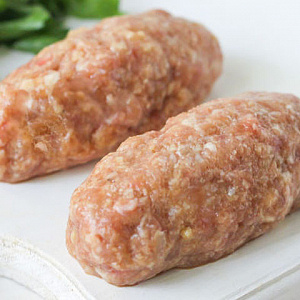Half a kingdom for a kilo. Why prices for sausages in the Altai Territory continue to break records

In 2021, MEAT products rose in price most of all (by 20%) in RUSSIA. The statistics in this regard are inexorable: a kilogram of sausages or sausages in the Altai Territory already costs almost 400 rubles, but this, as they say, is the average temperature in a hospital. On the shelves you can find products for 720 rubles per kilo.
What is happening now
About Russian record-breaking sausages in early January, the Evotor it company, which installs smart cash registers in our country, reported.
She conducted her own monitoring on the so-called non-chain retail and this is what happened.
“Over the year, dumplings and sausages have risen in price most of all - by 20%. Prices for butter rose by 19%, for buckwheat - by 18%, vegetable oil - by 17%," the study says
. In second place in terms of price increase - by 4% - were all the same butter, sour cream, pasta and buckwheat.
Anyone who goes to the store sees perfectly well that the situation in online retail is about the same. Official statistics echo this. According to Altaikraistat data as of January 10, 2022, sausages and wieners in our region cost 393 rubles per kilogram. The most expensive ones are in Rubtsovsk at 396 rubles per kilo.
The price of semi-smoked sausage has come close to 500 rubles per kilo, and 420 rubles for boiled sausage. But all this, once again, is average data. Semi-smoked products have risen in price most of all - by almost 10% - over the past month in the region.
What's going on with production
There are fewer and fewer sausages in the Altai Territory. If in 2017 local enterprises produced 12.5 thousand tons of this product, then in 2020 - already 10.8 thousand tons. For 11 months of 2021, slightly more than 10 thousand tons of sausages were produced in Altai. The trend is clear.
Officials in this case are talking about a change in the structure of consumption and the transition to more useful semi-finished meat products. In part, perhaps, there is truth in these words. The only “but” is that these same semi-finished products, chilled and frozen, were produced almost 16% less in January-November.
How prices have risen
Entrepreneur Dmitry Khalyavkin, HEAD of the Meat Union of Altai, says that alarming “bells” began at the beginning of the pandemic, in the spring of 2020. Then the cost of many consumables used in production rushed up. But more on that later.
In the Altai Territory in 2021, raw materials have become one of the main and decisive factors. Here the link is simple: the price of feed has risen - the price of meat has risen. The expert explains that if a year ago beef of the first category in the wholesale sector cost 230 rubles per kilo, now it is 290 rubles.
The situation is similar for pork. With chicken meat, it is even more difficult: the closure of the Ptichye Tsarstvo plant (formerly Altai Broiler) due to a fire only added to the tension on the market. The price for different types of cutting, according to expert estimates, increased from 20% to 60%.
The high-profile story about the ban on backyard slaughter in the Altai Territory further aggravated the situation. Dmitry Khalyavkin says: when the innovation came into force, the meat in the Barnaul markets disappeared almost completely for several days.
Processors, previously purchased from household plots, were forced to switch to raw materials from industrial enterprises. Those, in turn, quickly realized what was happening and began to use situations.
Here is the actual result.
And what about investments
Data on investment activity in the meat processing sector is only available for 2020. Altaipischeprom reports that seven projects have been implemented during this time. 36 new jobs created.
A pelmeni workshop was built in the Mamontovsky district, and a workshop for the production of semi-finished products was built in Barnaul. Also in 2020, the Solnechny, Sausage Yard, Altai, and Altai Broiler enterprises were modernized.
How the global market situation has affected
Spices for meat processors is a separate issue. Ingredients of the required quality, necessary for the food industry, are practically not produced in Russia and are imported from abroad, for example, from Germany.
But the German industrial machine, like the rest of the world economy, began to falter during the pandemic. As a result, there was a shortage, prices rose. According to the Altai meat processors, the rise in the price of spices for 2021 amounted to about 30-40%.
The situation is similar for packaging - the increase in the cost of plastic and film for various positions amounted to approximately 30-50%.
What the state will do
In November, the Ministry of Economy and the Ministry of Agriculture discussed changing the conditions for the import of meat to stabilize prices. The departments did not hide the fact that the situation is tense: beef and pork over the past year have risen in price on average across the country by 7.8% and 19%, respectively. Need to do something.
There is a possibility that in 2022 up to 200,000 tons of frozen imported beef may be exempt from duties. The same quota is proposed for frozen pork.
Importers will be required to process meat in Russia. But for now, these are only proposals that must go through all the stages of coordination of the clumsy bureaucratic system. Experts do not name terms of possible acceptance.
How often do prices change
Meanwhile, the producers themselves note that price increases occur, as a rule, twice a year. One wave falls on the period of the New Year holidays, the second - on May, the beginning of the barbecue season.
How the situation will develop in this difficult year, they do not undertake to accurately predict. Experts note that under the current conditions meat processors have two possible ways. The first is to reduce costs by saving on raw materials and other ingredients, coming up with new options to reduce the cost of products.
The second is a further increase in prices without regard to a possible reduction in consumer demand. Adherents of this path believe that the global food crisis is only gaining momentum and the worst is yet to come. So, half a kingdom for a kilo may soon become not a luxury at all.
Read together with it:
- "Белорусские продукты - страновой бренд". В Гродно поздравили работников сельского хозяйства областиФото 13 ноября, Гродно. В Гродно торжественно поздравили с профессиональным праздником работников сельского хозяйства, передает корреспондент БЕЛТА.Этот праздник в нынешнем году для аграрной отрасли региона особенный - впервые в истории в области собрали более 2 млн т зерна с учетом кукурузы. Как отметил в беседе с журналистами председатель комитета по сельскому хозяйству и продовольствию облиспол...
- Министр сельского хозяйства предлагает долгосрочные контракты для стабилизации цен на продуктыЛут подчеркнула, что за последние десять лет рост цен на основные продукты в России не превысил общий уровень инфляции, а в некоторых категориях даже отстает от нее. Тем не менее, наблюдается устойчивый рост себестоимости продукции из-за увеличения цен на технику, энергоресурсы и логистику. Для контроля ценовой ситуации министерство сотрудничает с депутатами и рядом других ведомств. Также она упом...
- В Тульской области уничтожили 24 кг санкционных сыров и мясных продуктов из ЕвропыВо время совместной проверки с транспортной прокуратурой из оборота было изъято 24,45 кг сыров и мясных изделий, произведенных в таких странах, как Дания, Испания, Норвегия, Италия, Ирландия и Франция. Ввоз данной продукции на территорию России запрещен в соответствии с указом Президента, касающимся специальных экономических мер. Изъятая продукция была ликвидирована путем измельчения и денатурации...
- Rosselkhoznadzor has banned meat imports from two Belarusian enterprises due to violations.In addition, three other Belarusian producers are now subject to strict laboratory monitoring due to initial deviations: azithromycin was found in poultry MEAT from Druzhba Poultry Farm, and the pesticide imidacloprid was found in honey from Pchalyar Polachchyny Farm. Powdered MILK from Luninetsky Dairy Plant was also found to containcoli bacteria . These measures were taken at the request of the ...
- Зеленский ввел санкции против своего бизнес-партнераМиндич и Александр Цукерман, который, как считается, отвечает за его финансовые вопросы, значатся как граждане Израиля. Санкции против них ввели на три года, они включают блокировку активов. На Украине сочли ограничения мягкими Владимир Зеленский Президент Украины Владимир Зеленский подписал указ о введении санкций в отношении совладельца студии «Квартал 95» Тимура Миндича и его знакомого бизнесме...
- Princess Eugenie's art gallery has been accused of violating sanctions against Russia.According to British authorities, Hauser & Wirth supplied "luxury goods to individuals associated with Russia" between April and December 2022. The Times reports that the person in question is Princess Eugenie of York, a Moscow-based collector.HM Revenue & Customs has accused the contemporary art gallery Hauser & Wirth, whose London branch is directed by Princess Eugenie of York, the daughter of P...




























































